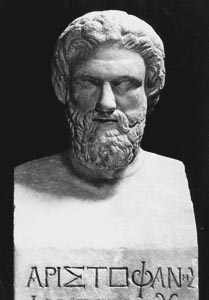Aristofane frasi celebri
Aristofane Frasi e Citazioni
Ecclesiazuse, Incipit
I cavalieri, Incipit
Origine: Gli Acarnesi, p. 109
L'ostaggio è una cesta di carbone e i minacciati in questione sono il coro dei vecchi Acarnesi, adirati con Diceopoli per la sua iniziativa pacifista nei confronti degli Spartani
Gli Acarnesi
“Chi vi vuole bene, vi fa paura.”
vv. 180-181
Ecclesiazuse
“L'uomo saggio in breve sa esporre molti pensieri.”
vv. 177-178
Tesmoforiazuse
'Dioniso', verso 1425; traduzione di Guido Paduano, 1996
Le rane
Aristofane: Frasi in inglese
“Sosias: The love of wine is a good man's failing.”
tr. O'Neill 1938, Perseus http://www.perseus.tufts.edu/hopper/text.jsp?doc=Aristoph.+Wasps+80
Wasps, line 80
Wasps (422 BC)
“Chorus: Under every stone lurks a politician.”
tr. in Bartlett 1968, p. 91 http://books.google.com/books?q=inauthor%3A%22John+Bartlett%22+date%3A1968-1968+%22Under+every+stone+lurks+a+politician%22 or Archive.org http://www.archive.org/stream/familiarquotatio017007mbp/familiarquotatio017007mbp_djvu.txt
Thesmophoriazusae, line 529-530
A play on the Greek proverb "Under every stone lurks a scorpion". In context, "orator" was a synonym for "politician".
Thesmophoriazusae (411 BC)
tr. Athen. 1912, vol. 1, Perseus http://www.perseus.tufts.edu/hopper/text.jsp?doc=Aristoph.+Ach.+751
Acharnians, line 751-759
Acharnians (425 BC)
tr. Lindsay 1925, Perseus http://www.perseus.tufts.edu/hopper/text.jsp?doc=Aristoph.+Lys.+1014
Lysistrata, line 1038-1039
Lysistrata (411 BC)
“Agathon: One must not try to trick misfortune, but resign oneself to it with good grace.”
tr. Athen. 1912, vol. 2, p. 278 http://books.google.com/books?id=6fxxAAAAIAAJ&q=%22one+must+not+try+to+trick+misfortune,+but+resign+oneself+to+it+with+good+grace%22
tr. O'Neill 1938, Perseus http://www.perseus.tufts.edu/hopper/text.jsp?doc=Aristoph.+Thes.+198
Thesmophoriazusae, line 198-199
Thesmophoriazusae (411 BC)
tr. O'Neill 1938, Perseus http://www.perseus.tufts.edu/hopper/text.jsp?doc=Aristoph.+Pl.+535
Plutus, line 535-539 & 548 & 552-554 & 558-561 & 563-564 & 567-570 & 575-578
Plutus (388 BC)
“Strepsiades: Whirl is King, having driven out Zeus.”
tr. in Lippmann 1929, p. 1 http://books.google.com/books?id=-E4WFG-G30sC&pg=PA1 and 4 http://books.google.com/books?id=-E4WFG-G30sC&pg=PA4
Clouds, line 828
Clouds (423 BC)
“Man is a truly cunning creature.”
(abridged tr. O'Neill 1938, Perseus http://www.perseus.tufts.edu/hopper/text.jsp?doc=Aristoph.+Birds+451)
Birds (414 BC)
“Bdelycleon: It is so that you may know only those who nourish you”
tr. O'Neill 1938, Perseus http://www.perseus.tufts.edu/hopper/text.jsp?doc=Aristoph.+Wasps+704
Wasps (422 BC)
“Phobokleon: Hunger knows no friend but its feeder.”
embellished tr. Parker 1962, p. 55 http://books.google.com/books?id=EdpxAAAAIAAJ&q=%22Hunger+knows+no+friend+but+its+feeder%22
Wasps, line 704
Wasps (422 BC)
“Chorus: [We] must look beneath every stone, lest it conceal some orator ready to sting us.”
tr. O'Neill 1938, Perseus http://www.perseus.tufts.edu/hopper/text.jsp?doc=Aristoph.+Thes.+529
Thesmophoriazusae (411 BC)
tr. in Bartlett 1968, p. 91 http://books.google.com/books?q=inauthor%3A%22John+Bartlett%22+date%3A1968-1968+%22Full+of+wiles%2C+full+of+guile%2C+at+all+times%2C+in+all+ways%2C+are+the+children+of+Men%22 or Archive.org http://www.archive.org/stream/familiarquotatio017007mbp/familiarquotatio017007mbp_djvu.txt
Birds, line 451-452
Compare the earlier-written but later-known: "The heart is deceitful above all things, and desperately wicked", Jeremiah, 17:9 KJV Bible http://www.biblegateway.com/passage/?search=Jeremiah+17:9&version=9.
Birds (414 BC)
“Blepsidemus: There is no honest man! not one, that can resist the attraction of gold!”
tr. O'Neill 1938, Perseus http://www.perseus.tufts.edu/hopper/text.jsp?doc=Aristoph.+Pl.+362
Plutus, line 362-363
Plutus (388 BC)
tr. Hickie 1853, vol. 1, Perseus http://www.perseus.tufts.edu/hopper/text?doc=Aristoph.+Cl.+366
Clouds, line 366-367 (our emphasis on 367)
The Greek-mythology equivalent of "There is no God."
Clouds (423 BC)
“Chremylus: [Wealth], the most excellent of all the gods.”
tr. O'Neill 1938, Perseus http://www.perseus.tufts.edu/hopper/text.jsp?doc=Aristoph.+Pl.+230
Plutus, line 230
Plutus (388 BC)
tr. Hickie 1853, vol. 1, Perseus http://www.perseus.tufts.edu/hopper/text.jsp?doc=Aristoph.+Cl.+998
Clouds (423 BC)
tr. Lindsay 1925, Perseus http://www.perseus.tufts.edu/hopper/text.jsp?doc=Aristoph.+Lys.+1014
Lysistrata, line 1014-1017
Lysistrata (411 BC)
“Strepsiades: ‘Tis the Whirlwind, that has driven out Zeus and is King now.”
tr. Athen. 1912, vol. 1, p. 350 http://books.google.com/books?id=9vpxAAAAIAAJ&q=%22Tis+the+Whirlwind%2C+that+has+driven+out+Jupiter+and+is+King+now%22
Clouds (423 BC)
“Strepsiades: Vortex reigns, having expelled Zeus.”
tr. Hickie 1853, vol. 1, Perseus http://www.perseus.tufts.edu/hopper/text.jsp?doc=Aristoph.+Cl.+828
Clouds (423 BC)
heavily rewritten tr. Frere 1839, p. 38 http://books.google.com/books?id=Bk8JAAAAQAAJ&q=%22Sickly%2C+calamitous+creatures+of+clay%22
Birds (414 BC)
tr. O'Neill 1938, Perseus http://www.perseus.tufts.edu/hopper/text.jsp?doc=Aristoph.+Birds+685
Birds, line 685-687
Birds (414 BC)
tr. O'Neill 1938, Perseus http://www.perseus.tufts.edu/hopper/text.jsp?doc=Aristoph.+Birds+812
Birds, line 812 & 817-819 (our emphasis on 819)
Birds (414 BC)
tr. Dillon 1995, Perseus http://www.perseus.tufts.edu/hopper/text.jsp?doc=Aristoph.+Frogs+1058
Frogs, line 1058-1059
Frogs (405 BC)
tr. Lindsay 1925, Perseus http://www.perseus.tufts.edu/hopper/text.jsp?doc=Aristoph.+Lys.+649
Lysistrata, line 649-651
Lysistrata (411 BC)
tr. Hickie 1853, vol. 1, p. 338 http://books.google.com/books?id=Cm4NAAAAYAAJ&pg=PA338
Birds (414 BC)
tr. O'Neill 1938, Perseus http://www.perseus.tufts.edu/hopper/text.jsp?doc=Aristoph.+Eccl.+590
Ecclesiazusae, line 590-591 & 597-598 & 651
Ecclesiazusae (392 BC)
